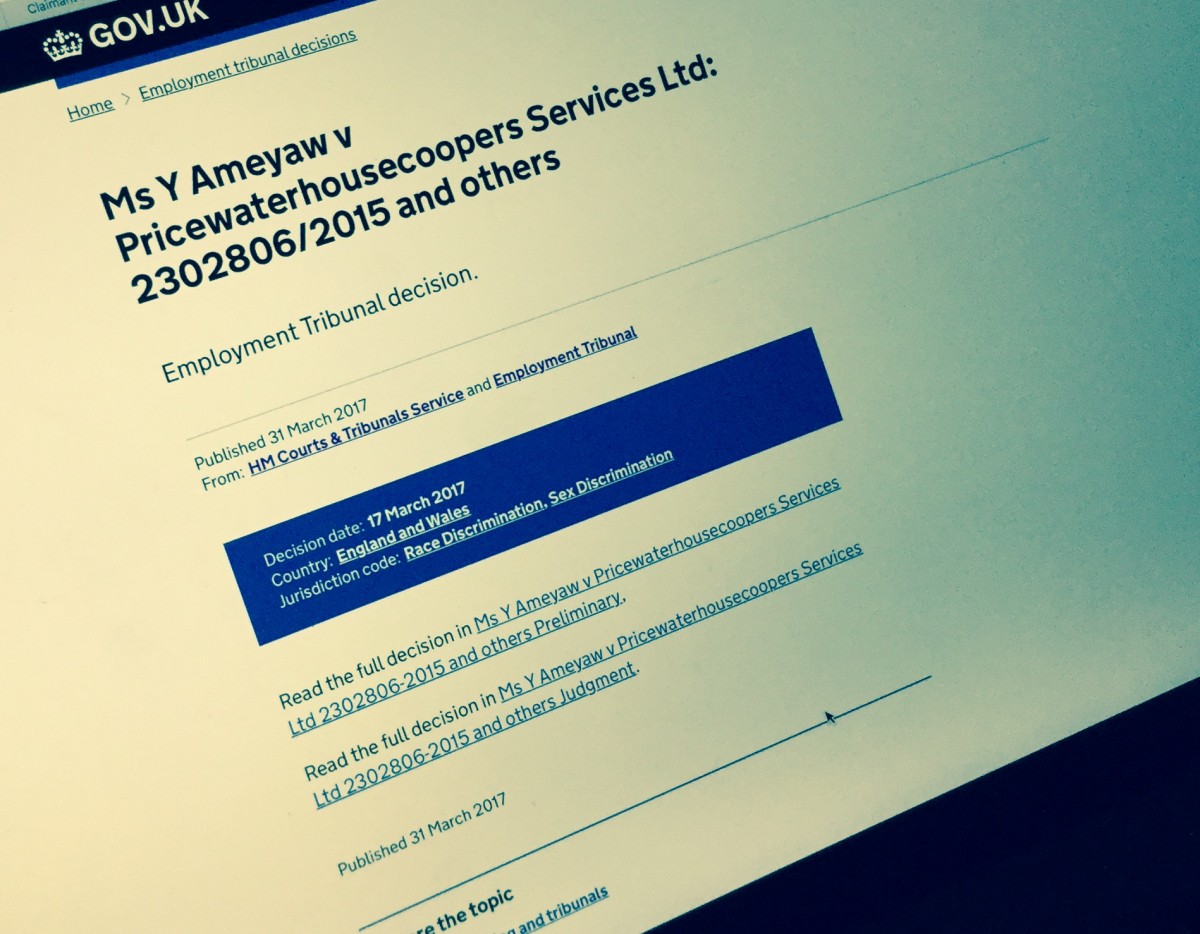Claimant’s right to privacy insufficient to prevent online publication of judgment
Since February 2017, it has been possible to obtain copies of Employment Tribunal judgments from an online database managed by Her Majesty’s Courts and Tribunals Service. When online judgments were first introduced, they were welcomed as a move towards open justice by adding transparency to the Tribunal process. One risk of any litigation, in addition to the concomitant time and cost, is the potential for reputational damage. Employers which fear having a public spotlight drawn to their activities are often keen to settle. However, the risk of damage to reputation applies to employees as well. The individual who has taken steps to assert their hard-earned employment rights might be labelled a troublemaker by potential employers.
Application for anonymity order
This was the difficulty faced by the claimant in the case of Ameyaw v PricewaterhouseCoopers Services Ltd. Miss Ameyaw was employed by PricewaterhouseCoopers (PwC) as a senior manager. She brought four claims against PwC which ultimately failed when they got to a final hearing. The early stages of the proceedings included a January 2017 preliminary hearing that was closed to the public and a hearing concerning an application to strike out the claim, which was heard in March 2017.
The judgment for the March 2017 hearing was published online and contained unflattering depictions of Miss Ameyaw’s conduct at the January 2017 preliminary hearing. Miss Ameyaw applied to the Tribunal for an order to (1) ensure the judgment relating to the final hearing would not be published, (2) remove the March 2017 judgment from the online register, and/or (3) anonymise her name in both judgments.
The application was made, Miss Ameyaw said, because she felt online publication of the judgments was harming her ability to find new employment. The Employment Tribunal rejected Miss Ameyaw’s application, so she lodged an appeal at the Employment Appeal Tribunal (EAT).
Appeal
The first question for the EAT to consider was whether the Tribunal had the power to exclude a judgment from the online register. The EAT found that it did not. The only exception permitted to the Tribunal was to exclude written reasons from a judgment if national security might be affected.
The second question was whether, if a judgment had to be published, should the Tribunal have exercised discretion and anonymised Miss Ameyaw in order to protect her right to a private life under Article 8 of the European Convention on Human Rights (ECHR).
In deciding this point, the EAT first had to consider whether Article 8 was triggered by the circumstances of the case. The EAT found it was not: Miss Ameyaw could have no reasonable expectation of privacy in respect of a public hearing.
The EAT decided to go further and consider whether, had Article 8 been engaged, Miss Ameyaw’s right to privacy would have outweighed the common law principle of open justice and the competing ECHR rights to a fair trial (Article 6) and to freedom of expression (Article 10). The EAT found the Tribunal had decided correctly that there was no basis for overruling the principle of open justice in Miss Ameyaw’s case. The fact that Miss Ameyaw had waited a year after publication of the March 2017 judgment before submitting her application for anonymity was a relevant factor in that finding.
The EAT also found that Miss Ameyaw’s right to privacy did not supersede the competing ECHR rights which would be satisfied through publication of her identity.
“The fact that the record of the proceedings, published without restriction, might be ‘painful, humiliating, or deterrent’ would not, of itself, mean that it should not be made public” Employment Appeal Tribunal
Comment
The EAT’s ruling confirms that parties face a high hurdle if they wish to prevent private details from being published in online Tribunal judgments. The Tribunal’s power to restrict the online publication of judgments is restricted to cases involving confidential information, or where required by the interests of justice, or in order to protect human rights. The EAT noted that it would be a rare case where a party’s human rights were so strong as to grant an indefinite restriction on publicity.
CASE Ameyaw v PricewaterhouseCoopers Services Ltd, Employment Appeal Tribunal, 4 January 2019
